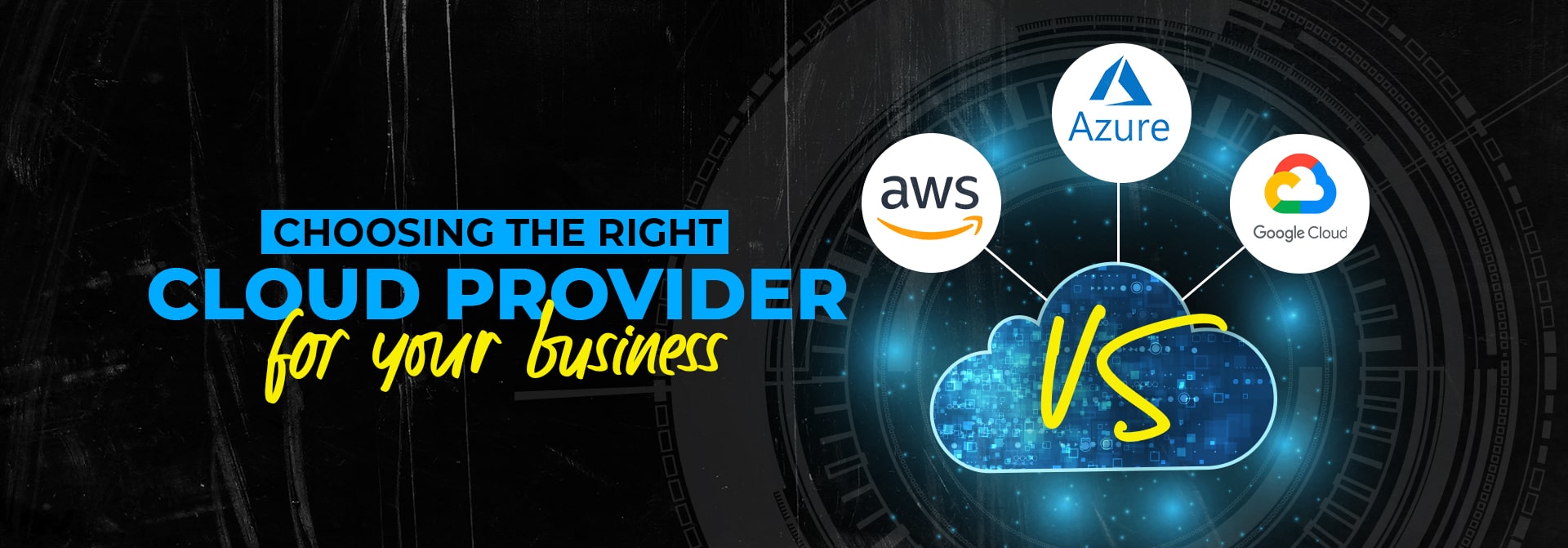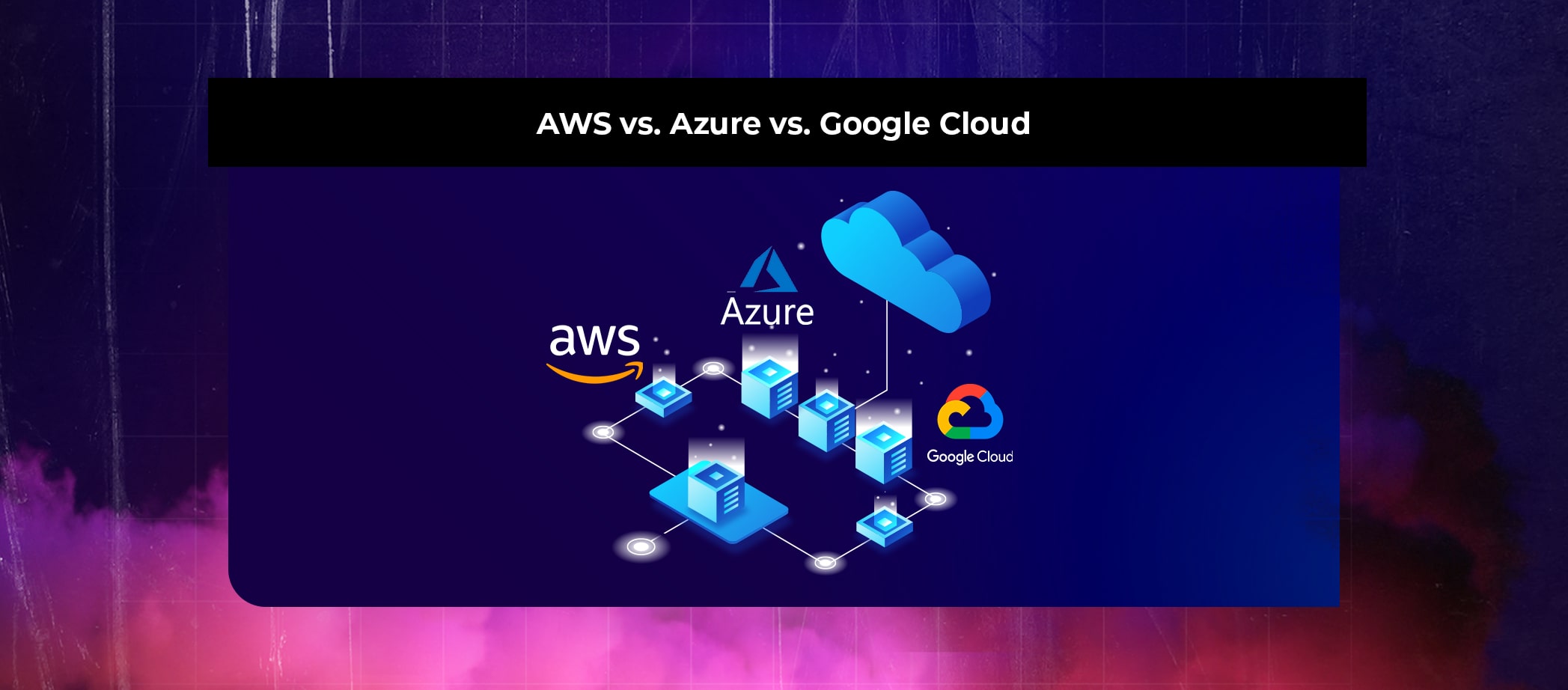
Cloud Computing has emerged as the backbone of innovation and growth for businesses of all sizes. Cloud platforms provide a scalable, flexible, and cost-effective solution to store, manage, and process data, enabling companies to focus on their core competencies while leaving the technical complexities to the experts. As cloud adoption continues to surge, three major players stand at the forefront of this technological revolution – Amazon Web Services (AWS), Microsoft Azure, and Google Cloud.
The performance, security, and general success of your company can be greatly impacted by choosing the best cloud provider. AWS, Azure, and Google Cloud each offer a plethora of services, features, and benefits, making the decision-making process a daunting task. To help you navigate this cloud maze and make an informed choice, this blog will delve into the strengths and weaknesses of each platform, empowering you to choose the perfect cloud partner tailored to your business needs.
Let’s dive into the world of AWS, Azure, and Google Cloud, and discover how these giants measure up against one another, and which one holds the key to unlocking your organization’s cloud potential.
Ding Dong! Cloud Calling!
Table of Contents
ToggleAmazon Web Services (AWS)
As one of the pioneers in cloud computing, AWS has established itself as the market leader with an extensive global infrastructure and an expansive array of services. From computing power to storage, databases, machine learning, and more, AWS offers a comprehensive suite of tools designed to cater to diverse business needs.
Strengths
- Global Reach: AWS boasts an extensive network of data centers spread across regions worldwide, ensuring high availability and low-latency access for your applications.
- Broad Service Portfolio: With over 175 fully featured services, AWS covers virtually every aspect of cloud computing, allowing businesses to build, deploy, and manage applications with ease.
- Mature Ecosystem: AWS has a vast community, making it easier to find resources, documentation, and support for your projects.
- Strong Security: AWS prioritizes security and compliance, providing multiple layers of protection to safeguard your data and applications.
Weaknesses
- Learning Curve: Due to its vastness, AWS can be overwhelming for newcomers, requiring time and effort to grasp its full potential.
- Cost Management: While cost-effective for many scenarios, understanding and optimizing costs on AWS can be complex.
Also Read: From Data Chaos to Data Mastery How to Build and Scale Data Lakes with AWS Services
Microsoft Azure
As Microsoft’s cloud platform, Azure has gained significant traction, especially among enterprises already leveraging Microsoft products. Azure’s integration with Windows and Microsoft applications makes it a compelling choice for businesses looking for seamless compatibility.
Strengths
- Hybrid Capabilities: Azure provides strong hybrid cloud solutions, enabling businesses to integrate on-premises systems with cloud services seamlessly.
- Enterprise Integration: For organizations using Microsoft products, Azure offers native integration with Microsoft tools like Office 365 and Active Directory.
- AI and Machine Learning: Azure’s AI and machine learning capabilities are robust, making it an attractive choice for data-driven businesses.
- Strong Support: Microsoft’s extensive customer support and enterprise focus make Azure a reliable option for large-scale deployments.
Weaknesses
- Regional Availability: While Azure has a global presence, not all services are available in every region, potentially limiting certain options.
- Complexity: Azure’s vast offering can be complex, and businesses may need expert assistance to leverage its full potential.
Raise your Security Posture with
PeoplActive’s AWS Security Engineers
Google Cloud
Google Cloud Platform (GCP) has quickly gained popularity, especially among organizations focused on data analytics, machine learning, and containerization. Google’s expertise in handling vast amounts of data sets it apart from its competitors.
Strengths
- Data Analytics and Machine Learning: Google Cloud excels in data-intensive applications and machine learning, making it ideal for businesses relying heavily on data analysis.
- Kubernetes and Containers: GCP offers excellent support for containerization and Kubernetes, allowing for seamless deployment and scaling of containerized applications.
- Global Network: Google’s fiber-optic network offers high-speed and low-latency connections across the globe.
- Competitive Pricing: Google Cloud’s pricing structure is competitive and straightforward, enabling businesses to optimize costs effectively.
Weaknesses
- Smaller Ecosystem: Compared to AWS and Azure, Google Cloud’s ecosystem is relatively smaller, potentially leading to fewer integrations and third-party tools.
- Customer Support: Some users have reported challenges with GCP’s customer support, especially for smaller businesses.
Also Read: How to Hire Certified DevOps Engineers Remotely in 2021(Azure, AWS & GCP)

Summing it up
Selecting the right cloud provider for your business is a pivotal decision that requires careful evaluation of your specific requirements. Each cloud platform has its strengths and weaknesses, catering to different business needs and use cases.
AWS, Azure, and Google Cloud are undoubtedly the top contenders in the cloud computing realm, each bringing its unique advantages to the table. AWS’s extensive service offering, and global reach make it a top choice for diverse workloads. Azure’s seamless integration with Microsoft products appeals to enterprises seeking a familiar ecosystem. Meanwhile, Google Cloud’s data analytics and machine learning prowess attract data-driven businesses and those focusing on containers. Consider your organization’s existing infrastructure, technical expertise, budget, and future growth plans before making a decision. It’s essential to weigh the pros and cons of each cloud provider in the context of your specific business objectives. Ultimately, choosing the right cloud partner will empower your business to scale, innovate, and succeed in the ever-evolving digital landscape.
If you’re still in need of assistance in navigating the complexities of cloud computing and choosing the right cloud provider for your business, look no further than PeopleActive Cloud Consulting services. Our team of expert cloud consultants is dedicated to understanding your unique business requirements, evaluating the strengths and weaknesses of AWS, Azure, and Google Cloud, and guiding you towards the optimal solution.
Ready to Hire Cloud Engineer




